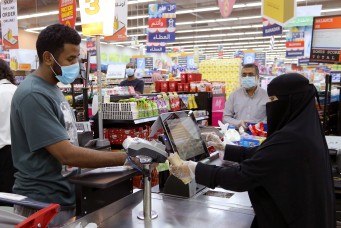Gulf States Face Their Biggest Challenge
The GCC states are now entering into the early stages of reconfigured citizen-state relations similar to what most other non-energy-rich Arab countries experienced from 1986 to 1995.
Keep your eyes on the oil-fueled Gulf Cooperation Council (GCC) Arab states in the year ahead, because they are just starting to experience a genuinely novel, almost existential, challenge that will test the quality of their statehood and national integrity as these have never been tested before. The issue that sparks this historic reckoning of statehood and citizenship in the GCC is not Iran’s nuclear future, the fate of the “Islamic State,” nor the wasteful war in Yemen. It is the sudden array of sharp fiscal adjustment measures that most GCC states have announced in the past three weeks.
These will curtail government spending, increase taxes and fees on citizens, and reduce the extent of the welfare state that has covered most of the basic life needs of most GCC citizens for the past two generations. The sharp and continuing drop in the price of oil is the main reason for this, given the GCC states’ reliance on oil and gas income for three-fourths or more of their state budgets, which in turn drive the private sector. So most GCC states have dipped into their plentiful reserves to make up for their budget deficits this year, which reached nearly $100 billion in Saudi Arabia and $20 billion in Kuwait.
Most also have already announced measures to reduce spending and increase revenues, such as issuing global bonds, drawing down their reserves, postponing or canceling some state-funded projects, raising corporate taxes, implementing a Value Added Tax, reducing gasoline, water and electricity subsidies, privatizing some basic services, and even introducing income taxes.
This is a significant test for the GCC states because for the first time in these countries’ bountiful modern history, citizens will have to bear more of the cost of state-building and their own comfortable life. The precise nature and depth of the relationship between governments and citizens is being tested as never before, because free or low-cost state services, alongside the injection of tens of billions of dollars into the private sector, are slowing, perhaps ending soon.
The high-spending decades since 1974 collectively provided all GCC citizens with a comfortable life, and some of them with a fabulous life in terms of material possessions. The fiscal adjustment measures being introduced across the board will impact every household and business in the GCC. The historic test ahead is how GCC citizens respond to the reduced role of their governments in the bounty of their lives. Citizens will have to work harder and be more creative, efficient, dynamic, and entrepreneurial in order to maintain their standards of living that has relied so much on state generosity.
We should watch for two critical issues in the year ahead: how Arab Gulf citizens adjust to the new fiscal burdens in their lives, and whether the increased fees and taxes they pay will prompt some of them to ask for more representation or participation in decision-making, in both the economic and political spheres. Human nature would suggest that the vast majority of citizens will respond positively and realistically, because for the first time in a substantive manner they will be participating directly in the exhilarating process of nation-building. That has not happened to date in the GCC countries—or in any Arab country, to be fair.
Arab citizens have had no real say in state-building decisions because they have paid few if any taxes to fund the state. No taxation and no representation across the Arab world has persisted as a state-building model because oil funds or foreign aid were available to pay for most things; simultaneously a huge underclass of low income and poor people expanded steadily in the past four decades to absorb the developmental gaps that Arab governments could not bridge.
That model shattered and collapsed in the past five years, its indicators including the Arab uprisings, the rise of ISIS and other Islamist radical movements that explicitly challenged the prevailing Arab order, and millions of people emigrating abroad legally or illegally in the most explicit sign of a mass rejection of their life conditions—even at the risk of losing their lives at sea.
The GCC states are now entering into the early stages of reconfigured citizen-state relations that are similar to what most other non-energy-rich, poorer Arab countries experienced in the decade from 1986 to 1995. That was when state budgets were slashed, currencies were devalued, prices increased, and employment rates were squeezed.
The citizen-state reconfiguration that GCC nationals will now navigate can be exhilarating and constructive, leading to long-term viability and stability, if it is handled responsibly. That did not happen in the non-GCC Arab states like Jordan, Syria, Egypt, Morocco, Yemen, and others. Those states’ lessons should help our GCC compatriots manage this historic moment during which may citizens will decide if they tighten their belts and join in the thrills of state-building, or skip the whole messy business and just move to London, New York, Toronto, or Sydney.
I expect that our GCC brothers and sisters will manage their transition to fiscal responsibility more effectively than other Arab states have done, including in the two critical arenas of drawing up sustainable national development plans and engaging their citizens in activities beyond only belt-tightening.
Rami G. Khouri is published twice weekly in the Daily Star. He was founding director and now senior policy fellow of the Issam Fares Institute for Public Policy and International Affairs at the American University of Beirut. On Twitter: @RamiKhouri.
Copyright ©2015 Rami G. Khouri — distributed by Agence Global


